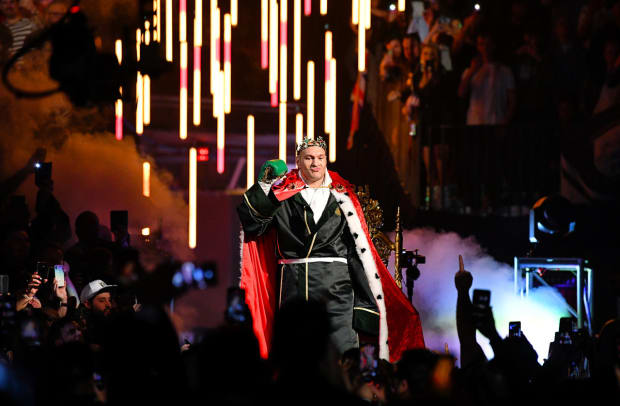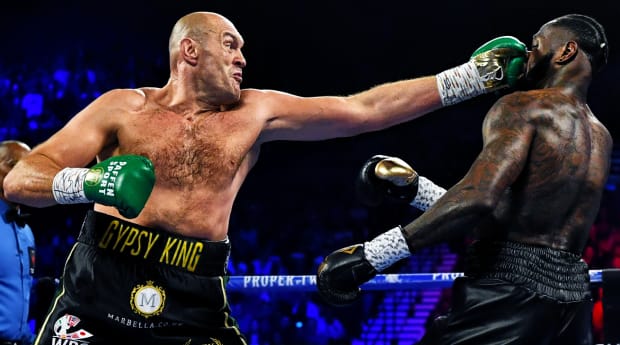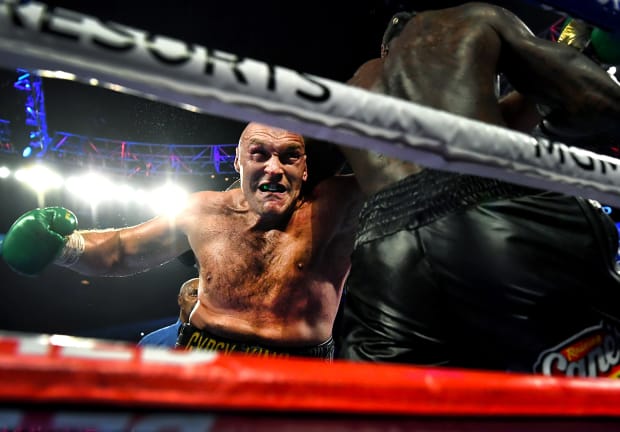Is Tyson Fury ready for Saturday's showdown? Is he the same fighter that brutalized Deontay Wilder nearly two years ago? There's a lot on the line for both heavyweights in Saturday's fight in Las Vegas.
LAS VEGAS — Tyson Fury was confident. Or was he? With Fury you can never really know. It’s late September and Fury is in a rented Las Vegas home, shirtless, Zooming with a reporter. It’s weeks before Fury’s WBC heavyweight title fight against Deontay Wilder, the third installment between two of boxing’s top big men. He talks about his recent battle with COVID-19 (“second time I got it,” says Fury) and the public back-and-forth between his brother, Tommy Fury, and social media star turned boxer Jake Paul (“I'd advise Tommy to take [Paul’s offer] if he was a bag carrier, a little corner man or something for Jake Paul”). And then he turns his attention to Wilder.
“Total excuse maker,” says Fury. “Piece of s---, bum f---stick. That's what Wilder is.
“I'd hate to be Deontay Wilder right now. He's mentally unstable. And when I put that final nail in his coffin, it's retirement. Bye-bye b---- Wilder. He used to be a gladiator. He used to be BombZquad, Bronze Bomber, the knockout man, and then he met the old fat Gypsy King, baldheaded, ugly bastard, who put him straight in his place and knocked him spark out in seven rounds.
“My mindset is knock him out. There's no two ways about it. I'm as fit as a fiddle. I'm six foot, nine inches tall and I can fight all day. So there's nothing else that I want to do apart from smash him into next week. If he's there and he wants a battle royal, let's do it.”

John W. McDonough/Sports Illustrated
Fury is boxing’s most fearless self-promoter, P.T. Barnum in a boxer’s body, Donald Trump with a left hook. Not since Muhammad Ali has the heavyweight division—hell, any division—seen such bravado. “When it comes to trash talk, he is the closest thing I have seen since Ali,” says Bob Arum, who promoted more than two dozen of Ali’s fights. “There is nobody in boxing that can compete verbally with Tyson Fury. Ali used to look for ways to disconcert opponents. Fury does the same thing.”
Indeed. On Wednesday, Fury—face to face with Wilder for just the second time since battering him in a seventh-round knockout in February 2020—poked at the former heavyweight champ. He mocked Wilder’s long list of excuses, which included accusing Fury of some of the most serious cheating violations in boxing history. He said Mark Breland, Wilder’s ex-trainer who was fired after throwing in the towel during a Fury barrage in the seventh round of the last fight, “saved [Wilder’s] life. He wondered why Jay Deas, Wilder’s longtime head trainer, wasn’t fired, too. “The truth resonates the most,” says Arum. “Ali did it with Joe Frazier, with Ken Norton, with Leon Spinks. He found a truth that he knew would bother them. And he picked at it.”
On the surface, Fury oozes confidence. But watching him grandstand, you wonder—how much does he believe, and how much is he trying to make himself believe? Even Arum can’t say. “All I know is I think he has exorcised his demons,” says Arum. Fury’s experience with mental illness have been well chronicled. In 2015, Fury defeated Wladimir Klitschko, stunning the boxing world and collecting three pieces of the heavyweight crown along the way. He didn’t fight again for two and a half years. In between, Fury sunk into a deep depression. He contemplated suicide. Once, in the front seat of his Ferrari, burning over a bridge at 190 miles per hour, he even attempted it.

John W. McDonough/Sports Illustrated
Boxing, in part, saved Fury. It gave him a purpose. It got him back in shape. Two low-level wins in 2018 led to an end-of-the-year showdown with Wilder. What was initially panned as a one-sided fight for Wilder turned into a thriller, with Fury climbing off the deck twice—including from a savage combination in the 12th round—to salvage a draw. That eventually led to the rematch last year, where Fury dominated the division’s most feared heavyweight.
That was 20 months ago. COVID-19 scuttled a planned rematch last fall. An arbitration battle—Fury was attempting to move on to a lucrative showdown with Anthony Joshua—delayed it further. Fury’s bout with COVID-19 moved it from the summer to Saturday night. By Fury’s count, he has had as many as five training camps for this fight.
Is Fury ready? Is he the same fighter that brutalized Wilder nearly two years ago? Wilder has been the one in the spotlight in recent weeks. For his accusations toward Fury. For his change in trainers—former heavyweight Malik Scott has taken over Wilder’s corner. For his mindset coming off his first professional defeat. Wilder needs a win to reclaim his heavyweight title. He may also need one to punch a ticket to the Hall of Fame.

John W. McDonough/Sports Illustrated
Fury has largely skirted the questions. But there have been some. Wilder has accused Fury of faking his COVID-19 diagnosis last summer. He has engineered a whisper campaign suggesting Fury was getting beat up in sparring. Eddie Hearn, Joshua’s promoter and an occasional Fury antagonist, says Fury “isn’t in the kind of condition he was for the second fight.” This week, Fury’s trainer, Sugar Hill, said that Fury was likely to come in 20 pounds heavier than he weighed in the last fight—though Hill emphasized the weight was more muscle than fat.
“I took a month off after I got COVID,” says Fury, “because I'd been in training camp say three months before that. So I was already ready to go, so I didn't take any extra time to prepare. Why do we need to prepare for a bum like Wilder anyway? I could fight him on three days' notice at f---ing 400 pounds and still knock the p---- out.”
We’ll see. Fury has plenty at stake in this fight, too. A win pushes him forward, potentially toward a lucrative, all-British showdown with Dillian Whyte, while he waits for Joshua and Oleksandr Usyk to settle their differences early next year. It moves him one step closer to the undisputed championship. To being known as the best heavyweight of this generation.
A loss changes that. It could mean a fourth fight with Wilder, which represents a boatload of money, but plenty of risk. It could mean a rebuild that Fury, undefeated, at 33, may not be prepared to undertake. Deontay Wilder’s career is on the line on Saturday. But there is plenty for Tyson Fury to lose, too.
More Boxing Coverage:
• The Reinvention of Deontay Wilder
• Anthony Joshua Needs to Make a Radical Change
• Why Tyson Fury Is Sports Illustrated's 2020 Fighter of the Year